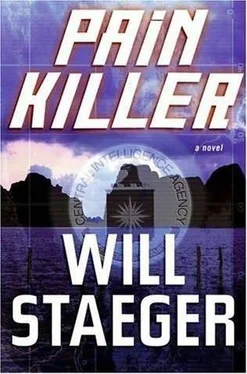Standing at the front of the formation, elbow locked in salute with the others, was Rear Admiral Li Zhu. Li’s breast and shoulders gleamed with medals; his skin was of a much darker complexion than most of the soldiers behind him, his expressionless face angular and lean-a career soldier who hadn’t let himself go. As loyal, Deng thought, as his driver, and entrusted with more secrets than he ought to be. Li was fifteen years his junior and, in Deng’s estimation, about half as quick on a horse. The general almost felt guilty about beating Li on the polo grounds, so easily did victory come.
As the rotors of the airborne limousine lost steam, Deng waved one of his elite guards to the door. The guard saluted, slid the door open, and rolled out a modular stairwell. A second sentry accompanied the first out the door and each took his assigned position at the base of the stairwell.
Deng came out, stoic, pausing on the last stair before descending to the tarmac. He knew the medals adorning his uniform to be blinding in the sun, easily dwarfing Li’s; it was good to let the soldiers admire them. At length he stepped down to the runway and crossed the twenty meters of asphalt between himself and Admiral Li, who held his salute until Deng, passing, dismissed it with one of his own. Over the rotors, turbines, and diesel engines, it was hard for Deng to make out the words as Li spoke, but it sounded to him as if the admiral said something about how honored he and his men were to receive such a great leader as their comrade general and State Council vice premier here at Shandong’s humble naval base.
Deng acknowledged Li’s comments with a halfhearted nod and continued walking.
They had a hundred-meter walk to the first in a convoy of jeeps; once they climbed aboard, the procession jerked to life. The head jeep leading the way, it was only a matter of seconds before the convoy vanished into the sea of troops.
Deng called it the War Room. It was one of seven he’d personally designed, ultimately ordering six built as impenetrable underground bunkers beneath China’s six largest military installations, and a seventh aboard a People’s Liberation Navy nuclear attack submarine. The technical name for these installations was Military Operations Oversight Facility, but the way Deng saw it, he could run a war out of any one of these rooms, so he’d gone ahead and fallen back on the default term.
Given the method by which military powers had come to engage in war, Deng’s War Rooms offered the ultimate control seat. He had spared no cost, not in construction budgets or, more important, the spy operations that fed the engineering effort behind the construction. PLA technology, represented best by that which was fed into these War Rooms, had nearly matched that of the American military-industrial complex, mainly due to the fact that Chinese army intelligence had stolen most of the significant technological innovations developed by American military contractors.
From his War Rooms, Deng could watch everything imaginable related to any armed conflict conducted by his troops. Any image that could possibly be generated in the field was projected on massive plasma screens; he could control every aspect of war with the flip of a switch, from ordering blood work on a soldier taken ill in Kazakhstan to the launch of biological warheads in the European theater. All he had to do was whisper a command to the technicians manning the main keyboard.
The land-based War Rooms were built deep underground, shielded behind twenty-foot-thick walls of titanium, concrete, and lead, designed to deflect the electromagnetic pulse of an adjacent fifty-megaton nuclear explosion. The power supply was quadruple-redundant. Any military action China was capable of undertaking, Deng could activate it from his War Room throne, and virtually no one could stop him from doing whatever he chose to do while he was planted there.
Admiral Li led the general out of an elevator and down a bright hallway. At the end of the hall, the admiral ushered him through an immense vault door, where a fresh duo of military police snapped off salutes and the two MPs who had escorted them thus far turned and left.
Inside, it was dark, though not pitch-black. The room possessed a luminescent glow-similar, Deng liked to think, to the glow of a beach under the light of the moon. Deng could hear the familiar orchestral cacophony: the clatter of keyboards, the whirring of computer fans, murmured conversations of a hundred hushed voices. Li led him up a stairwell to a room resembling a film projection booth: the Control Box-Deng’s throne, from which he beheld the glory of his creation.
Spread in a crescent before him, built precisely two meters below the level of the Control Box, lay the heart of the War Room-a deep amphitheater sprawling under vaulted ceilings, the room about the size of a polo field. A staff of more than a hundred men scurried back and forth in the air-conditioned darkness; endless rows of workstations, radar and sonar monitors, electronic map displays, telecommunications and video conferencing systems, and the halogen reading lamps positioned throughout the room combined to form the glow Deng had observed upon entering. A pair of technicians manned the Control Box, a room resembling the cockpit of a commercial airliner; an opening at the front of the cockpit, six meters wide by two tall, offered the view to the main floor and could be sealed, Deng knew, by a soundproof, one-way-mirrored glass shield at the touch of a button.
Deng and Li were shown to their seats by one of the technicians and handed a pair of wireless headsets. Deng pulled his over his ears.
Li bowed. “You’ll be presented with a time-lapsed but otherwise complete presentation of the invasion simulation exercise.” He waved to one of the technicians. “Begin!”
Commencing an instant later, and for the next fifty-one minutes, Deng’s senses were assaulted by war. He watched a campaign waged from sea to land, primarily through the images on the multiple high-def plasma screens-views from spy planes; angles from tanks, personnel carriers, helicopters, aircraft, soldiers’ helmets; enlarged images of radar screens depicting opposing troops; reports from embedded foreign correspondents assessing the strategy and carnage. Incoming status reports blasted across a loudspeaker system; in addition to the full media coverage, the simulation included the meticulous replication of calculated diplomatic responses from world leaders. Strategic decision making was displayed via security-camera angles eavesdropping on senior staff meetings held at the command bunker.
If he didn’t know that the exercise depicted had already taken place, Deng would not have been able to tell the difference; for all intents and purposes, the simulation was nothing short of real war.
At the conclusion of the presentation, Li tugged off his headset.
“You’ll find we surpassed your objectives in every aspect of the exercise.” He reached across the desk and handed Deng a thick report.
Deng’s eyes found the report on the desk, and Li beside him. He stared at Li for longer than he wanted, knowing his eyes were lit with a sort of euphoric lunacy-something he didn’t particularly want Li observing. No matter: he had seen a slice of tomorrow, and he liked the way it looked. He broke eye contact and stood.
“It is upon us,” he said.
Li rose to proffer a salute, but Deng had already reached the exit hall, so the gesture encountered only empty air.
The general had seen what he’d come to see.
Laramie had chosen a black suit, looking the part on a Monday morning she had not been looking forward to. The call came at nine-fifteen; it was Peter M. Gates’s secretary, known as Miss Anders, who asked whether she had a moment to come and visit with Mr. Gates.
Читать дальше












